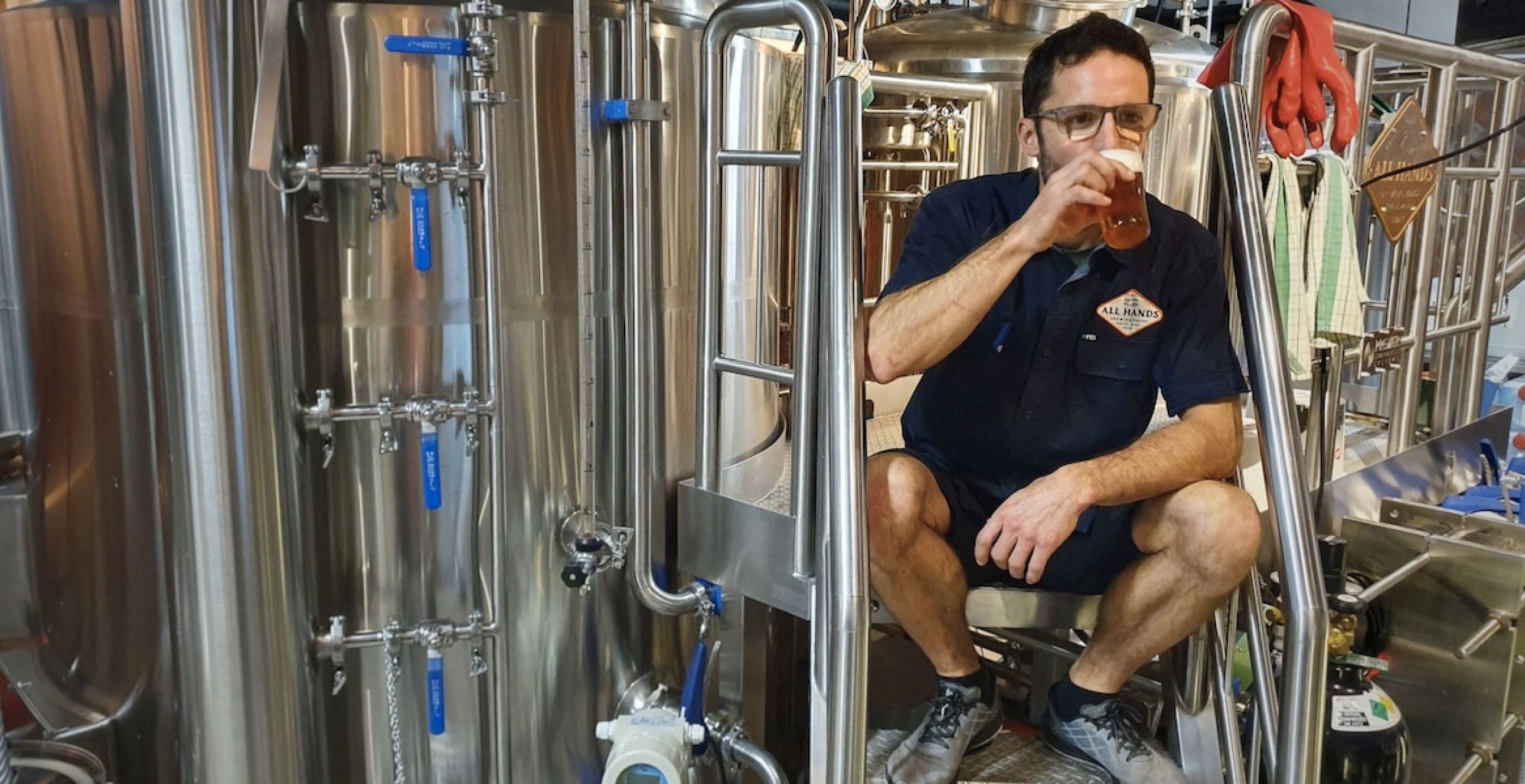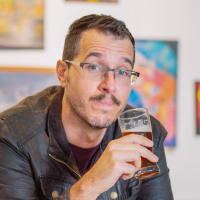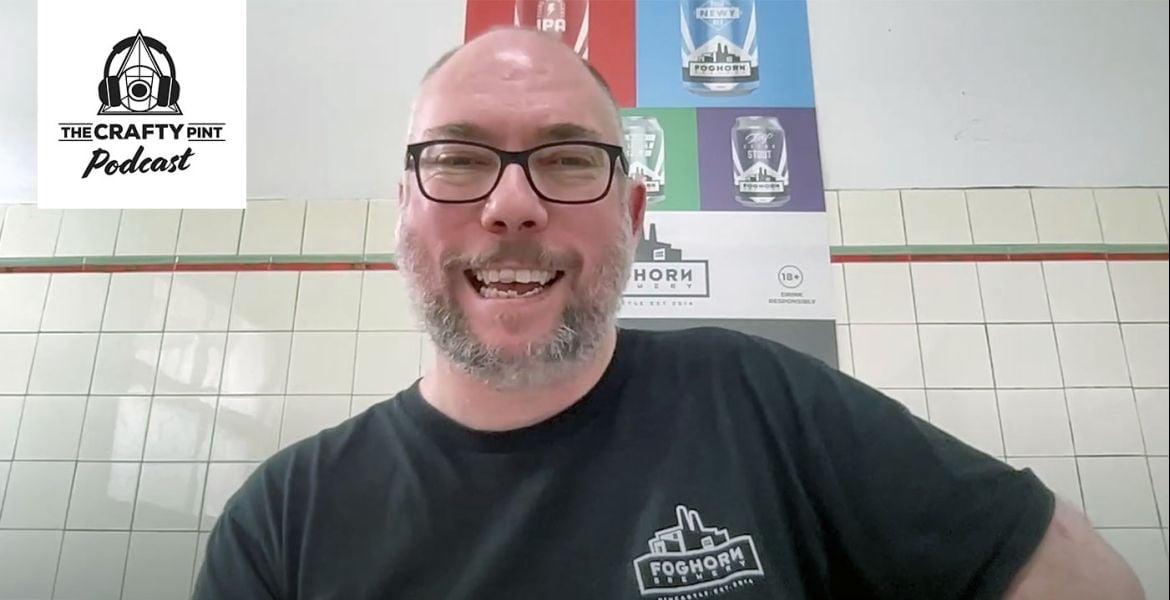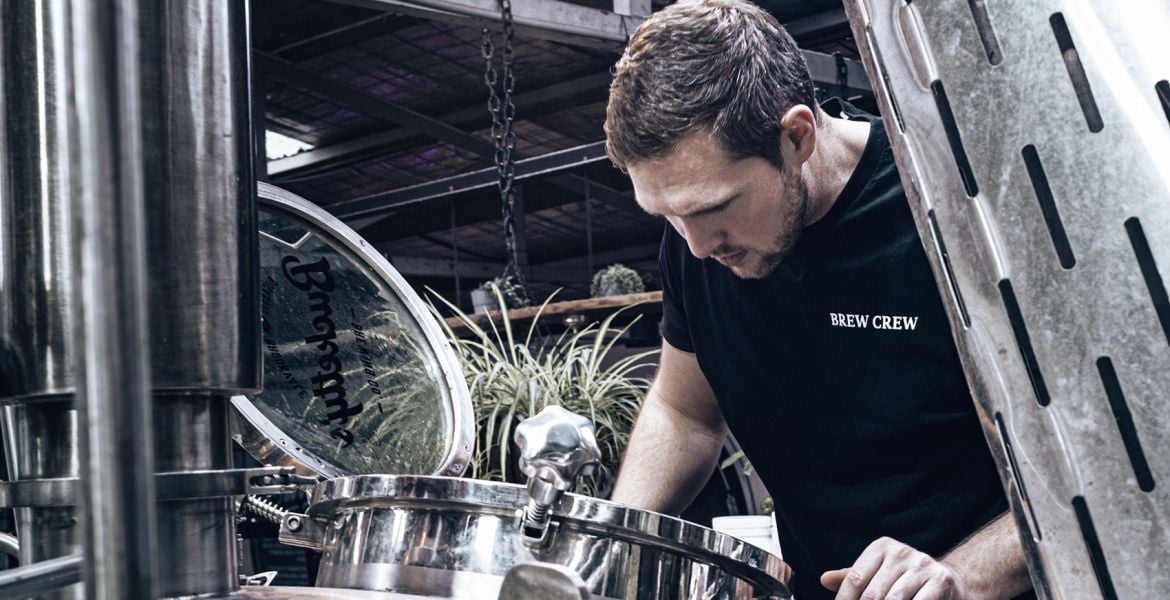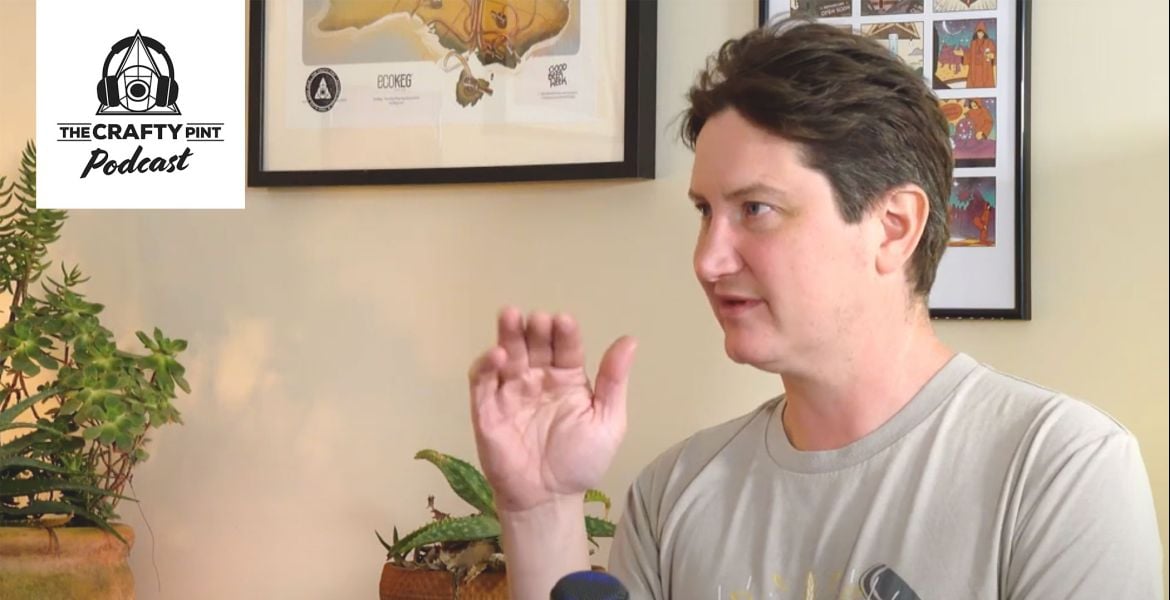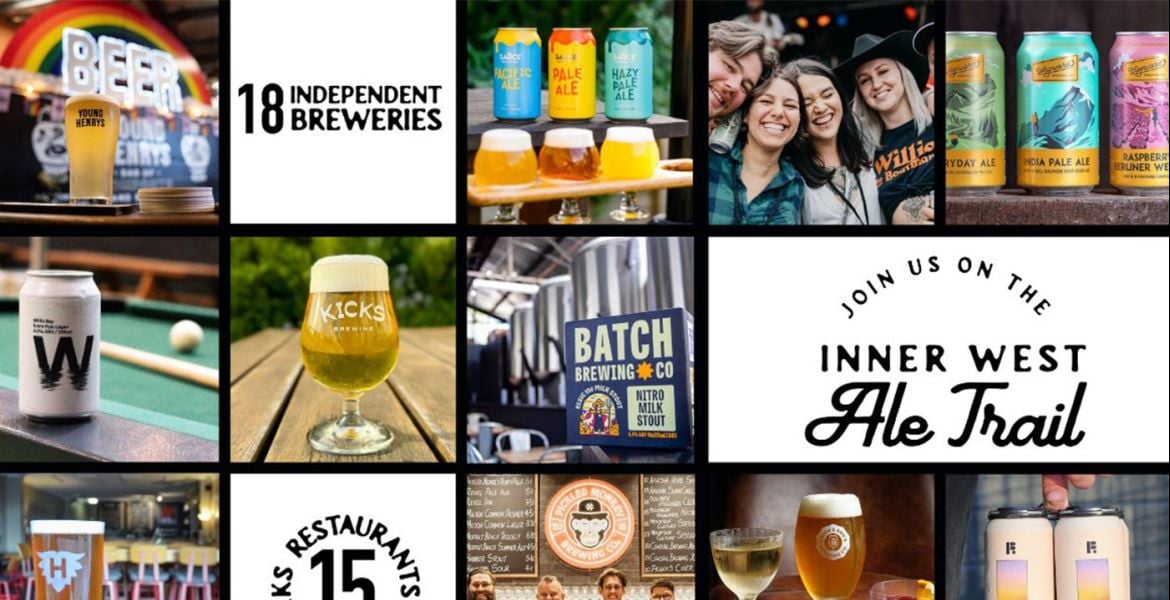“Brewers are essentially just glorified janitors who farm yeast on the side.”
Studying enzyme function relating to metabolism in snails. It doesn’t sound like an obvious precursor to brewing. But for Sam Clayman, head brewer at All Hands Brewing House, it was exactly that.
Sam started homebrewing while he was doing his PhD in metabolic biochemistry, and quickly found that the fields had plenty of overlap. (Turns out snails and yeast aren’t as different as you might think.) While many people struggle with the science when they start brewing, he found that everything he was reading just made sense.
With this head start, Sam’s move into commercial brewing was smoother than some, and largely consisted of tinkering with pressures, speeds, and hydraulics.
His first brewing job had him working on his own in a venue where many of the punters were disinterested in tasting the beers he was making, let alone giving him feedback – “I’ve been drinking Tooheys New for 40 years, and I’m not about to change now!” As a result, Sam had to figure out how to manage without input from others.
“You have to be good at research,” he says. “When there’s no one around and you want to ask a question, you either have to jump online, get on the phone, or just fuck it up 'til you stop fucking it up.”
His personality and skillset held up well in such an environment. There may be plenty of scientists who enjoy being in their head all the time, but Sam also enjoys working with his hands. He’s constantly monitoring his processes and looking for ways to improve, and thrives in the interplay between “thinking” and “doing”. And, now, whenever he gets the chance, Sam’s inquisitive nature pushes him to pick the brains of any other brewer he talks with, as he’s still always wondering if there are ways to do things faster, or cleaner, or better.
Of course, this perpetual striving to improve works to the benefit of All Hands. When you’re walking along Darling Harbour, appreciating the open sky and avoiding the tourist traps, it’s comforting to enter a brewery where there’s a biochemist perfecting beer recipes.
Despite his knowledge, Sam reckons brewing isn’t all about the science. He holds intuition and experience as invaluable tools alongside the scientific processes. And, above all else, he enjoys the things he can’t explain – the variables and uncertainties of living organisms like yeast.
“I went into science because I love nature. I have a good understanding of the biological basis behind what's happening in brewing, but I've never been a brew-by-the-numbers person. I actually enjoy the variation in nature – and in brewing – and think it’s something to celebrate.”
Spend some time with Sam, and enjoy the understanding and uncertainty of brewing, in this Brew & A.
Sam Clayman – All Hands Brewing House
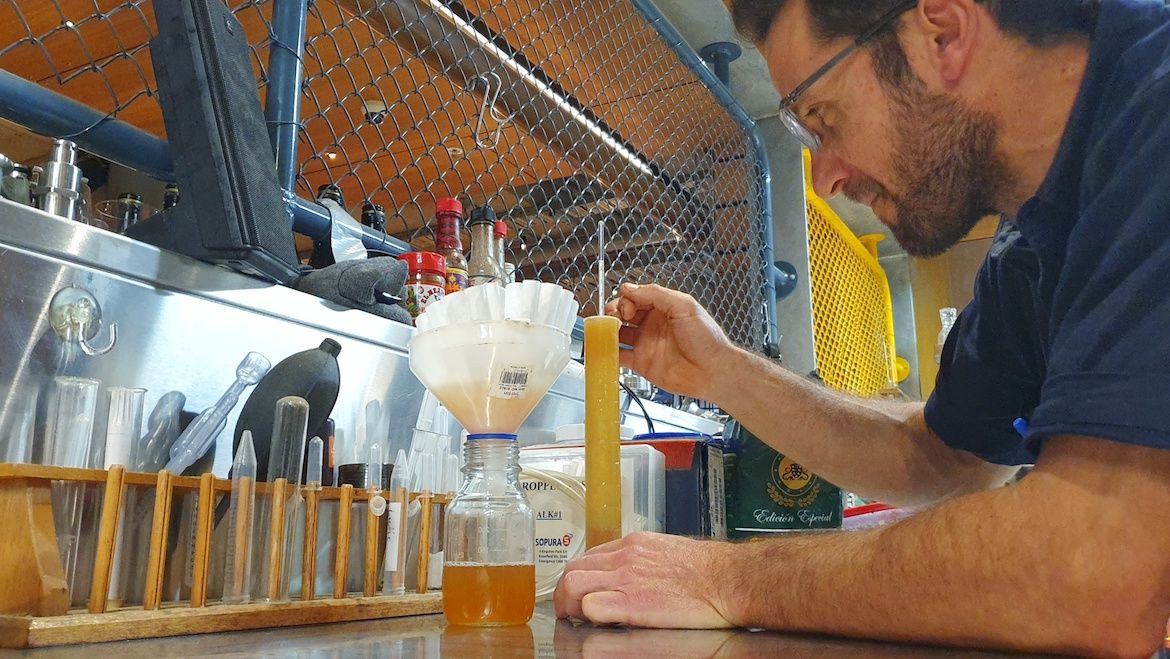
Why are you a brewer?
Brewing is a great blend of science, problem solving, working with live organisms, physical work, and social interaction that appeals to my need to move and think at the same time. There’s always something new to learn, and the brewing community is a wonderfully supportive and collaborative group of likeminded people. The result is a big bonus too!
What would you be if you weren’t a brewer?
A gardener/landscaper, for the same reasons above. I enjoy the feedback from living systems in my work almost more than anything else.
What was your epiphany beer?
Sierra Nevada Pale Ale. Or rather, the absence of it. Growing up in California, it was the "good beer" that we treated ourselves to occasionally while not really knowing why it was good. I took it for granted until I moved to Australia in 2004 and there wasn’t a "good beer" option easily available. Only then did I realise what it was and how much I missed a decent beer!
How did you first get involved in the beer world?
Homebrewing and luck. Having started homebrewing as a postgrad student, I finished the degree and I didn’t want to continue in academic research so had a shot at brewing jobs. The first job was a stroke of pure luck, as Paddy’s Market Hotel picked me up to run their tiny operation and work as a bar manager as well.
I found I was only good at one of those two positions, so here I am still in a brewery!
What's the best beer you’ve ever brewed?
With the installation of new equipment in 2017 (All Hands was previously the King St Brewhouse with beers bearing the Red Tape brand name), I feel like our beers have made giant leaps in quality, so our best beers have been the recent ones.
A Märzen that just went through was fantastic, with brilliant clarity and great mouthfeel.
I’m also particularly proud of our new mid-strength, the Rouseabout Pale Ale, since we’ve played with some biotransformative yeast and high-oil NZ hops for a really complex hop character that complements the full-bodied Voyager malts amazingly well. You don’t even register the lower ABV, with all the flavours running around your palate.
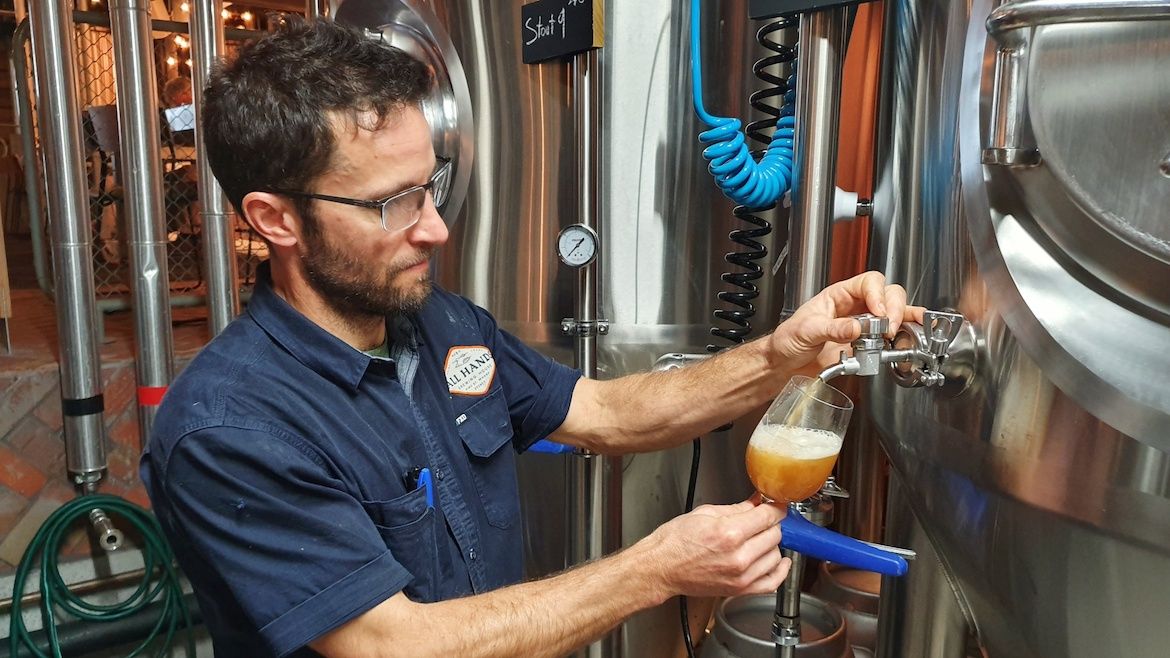
What's your single favourite ingredient to use in beer?
Yeast! They are the living component, the beast in the dark confines of the fermenter that actually makes beer. There’s so many strains available (not to mention the bacteria that are giving sours a resurgence), and they all have such distinct characteristics. Then you can tweak the outputs with simple brewery processes to get a huge, yet subtle, array of characters in your beers.
I love doing beers with simple hop schedules that let an interesting yeast strain shine through. It really blows people’s minds when they find out that so much flavour can come from something other than hops and adjuncts.
Are there any beers you’ve brewed that might have been better left on the drawing board?
Oh, you mean “educational beers”! Yes, there’s been a couple over the years. Luckily not many. Usually it is a case of getting overexcited about a new type of malt or hop, and using it in gluttonous quantities in an effort to understand how it works. And sadly, sometimes gluttony is not where it's at.
But there are many lessons to take away, and some of my best beers have followed from those unleashed bastard brews, when a more judicious hand has teased out some lovely nuance from those same ingredients.
If you could do a guest stint at any brewery in the world, which would it be and why?
Either Sierra Nevada, for a look into their environmental sustainability measures and hopping processes. Or Pilsner Urquell to understand the processes behind getting such rounded malt character out of such simple grists, and how to get the amazing balancing bitterness from their hops.
Which local (Aussie or Kiwi) breweries inspire you?
Coopers always jumps out here. Sparkling Ale is such a great example of malt and yeast character driving a beer to near perfection. And the consistency over such a long time is remarkable.
What's your desert island beer – the one to keep you going if you were stranded for the rest of your days?
Unabashedly, Tecate Lager. Simple; hard to get bored of; great in basically any weather; and if there’s a taqueria on my desert island, I’m properly set for eternity.
And what would be the soundtrack to those days?
Probably Sublime’s “The Living Is Easy” if there was a taqueria on the island. With no taqueria, it would be more like Dr John’s “Right Place, Wrong Time”.
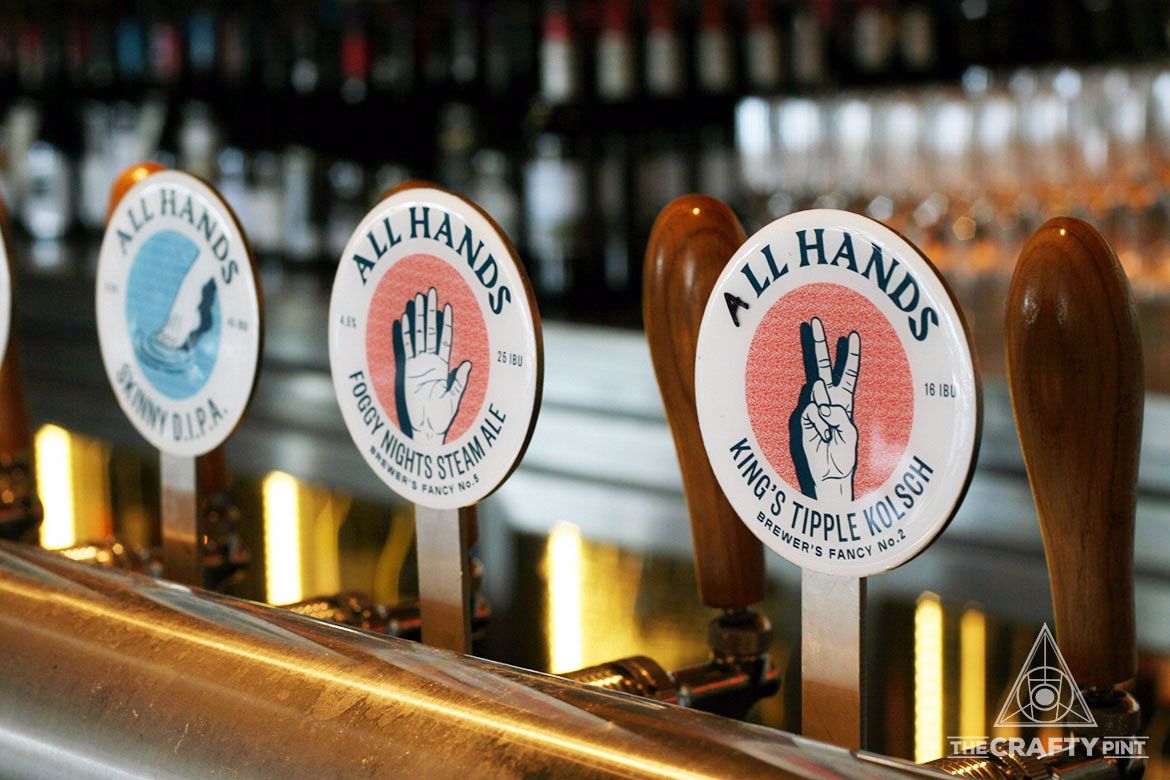
If you couldn’t have beer, what would be your tipple of choice?
Grappa. Every wine has its accompanying grappa, with its essence distilled down to the base of its vinous identity and origins. The subtleties of grape and terroir remain, but with a touch more warmth!
What's the one thing you wish you’d known before becoming a brewer?
That brewers are essentially just glorified janitors who farm yeast on the side.
And the one piece of advice you’d give to anyone considering a career in craft beer?
Learn your processes well; having your brewhouse, cleaning, and yeast handling basics really tight are more important in the beginning than knowing the scientific names of every yeast and bacteria in the vault.
And never stop thinking and analysing those processes while you do them; the little improvements that take a beer from good to great are almost always more about process tweaks than about recipe changes or just being a rockstar.
Try Sam's beers at All Hands Brewing House, 22 The Promenade, King Street Wharf.
You can find other entries in the long-running Brew & A series here. And you'll find All Hands and hundreds of other good beer venues across Australia by downloading the free Crafty Pint app.





